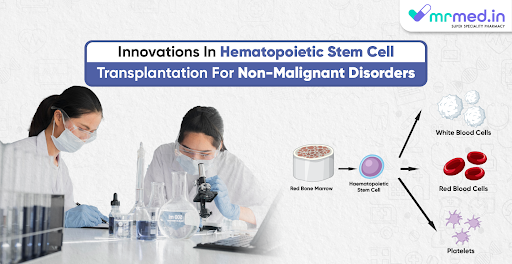Hematopoietic stem cell transplantation (HSCT), hitherto mainly used to treat cancers, has developed into a revolutionary treatment strategy for a variety of non-cancerous illnesses. Among them, the use of alkylating agents and anti-neoplastic medicines in allogeneic HSCT has distinguished itself as a key breakthrough, bringing in fresh hope for patients battling a variety of non-malignant illnesses. The exciting field of allogeneic HSCT is explored in this article, which also discusses the use of alkylating medicines in the treatment of non-malignant illnesses.
The Expanding Horizons Of Allogeneic Hsct: Beyond Malignancies
Leukaemia, lymphoma, and myeloma are only a few examples of the haematological cancers that have historically been treated using HSCT. However, the HSCT paradigm has drastically changed during the last few decades. This treatment has the potential to treat a variety of non-malignant illnesses, including but not limited to aplastic anaemia, sickle cell disease, and thalassemia, according to researchers and physicians. The development of tailored treatments that support the transplantation process as well as improvements in transplantation methods and immunology have all contributed to this increase.
The Role Of Alkylating Agents And Anti-Neoplastic Medicines
The use of alkylating agents and anti-neoplastic medicines is one of the major advancements in allogeneic HSCT for non-malignant illnesses. These substances, which have historically been used to treat cancer because they may break DNA and stop cell division, have a novel use in transplantation.
Alkylating medications including treosulfan, capecitabine and cyclophosphamide have become more popular in the setting of non-malignant illnesses. These medications are essential components of the conditioning regimen, a stage that entails giving the patient chemotherapy or radiation to open up the bone marrow and weaken their immune system, allowing donor stem cells to successfully engraft. Alkylating medicines are used because of their potent removal of immunological and bone marrow cells from the recipient, allowing healthy donor stem cells to enter.
Alkylating substances also aid in the development of mixed chimerism, a condition in which recipient and donor cells coexist in the recipient's body. The ability to partially correct the underlying genetic defect while reducing the risk of graft-versus-host disease (GVHD), a potentially fatal complication where donor immune cells attack the recipient's tissues, makes this phenomenon particularly advantageous in non-malignant disorders.
Innovations And Challenges In Allogeneic Hsct For Non-Malignant Disorders
Although allogeneic HSCT for non-malignant illnesses has shown encouraging outcomes when using alkylating medicines, there are still issues that need to be addressed. It is still difficult to strike the right balance between effective engraftment and cutting down on the danger of GVHD. The patient's unique traits and the specific disease must be taken into account while designing the conditioning programme. These problems have been addressed by innovations like haploidentical transplantation and reduced-intensity conditioning regimens, enabling safer and more efficient transplants.
Additionally, there is continuing study into the long-term effects of allogeneic HSCT for non-malignant illnesses. While many patients significantly improve their quality of life and disease symptoms after transplant, further research is required to determine how long these effects last and whether they might lead to problems.
Looking Ahead: Personalized Approaches And Beyond
Alkylating medicines continue to play a crucial role in the area of allogeneic HSCT for non-malignant illnesses, although within a wider context of personalised medicine. Genetic profiling and improvements in immunology are making it possible to customise treatment plans for specific individuals, improving results and lowering risks. The array of resources accessible to doctors and researchers is further expanded by the incorporation of cutting-edge cellular treatments like gene therapy and gene editing.
In conclusion, allogeneic HSCT developments, particularly the strategic use of alkylating agents and anti-neoplastic medicines, have completely changed the landscape of treatment for non-malignant illnesses. These developments have given patients and their families fresh hope in treating conditions like aplastic anaemia and sickle cell disease. Future therapies promise to be further more efficient and personalised as research on the complex relationships between transplantation, genetics, and immune responses advances. This will help people with non-malignant illnesses live better tomorrows.




